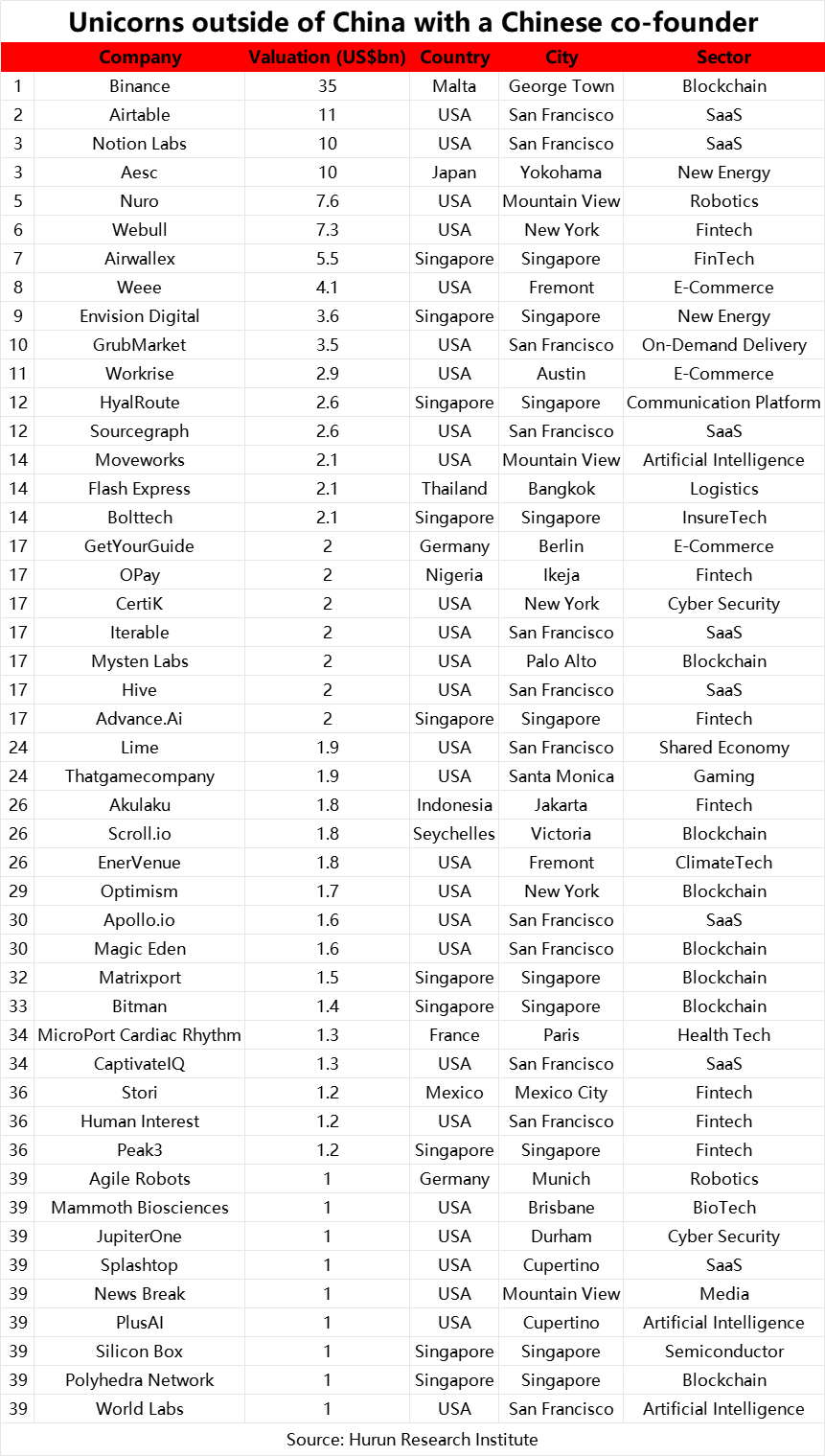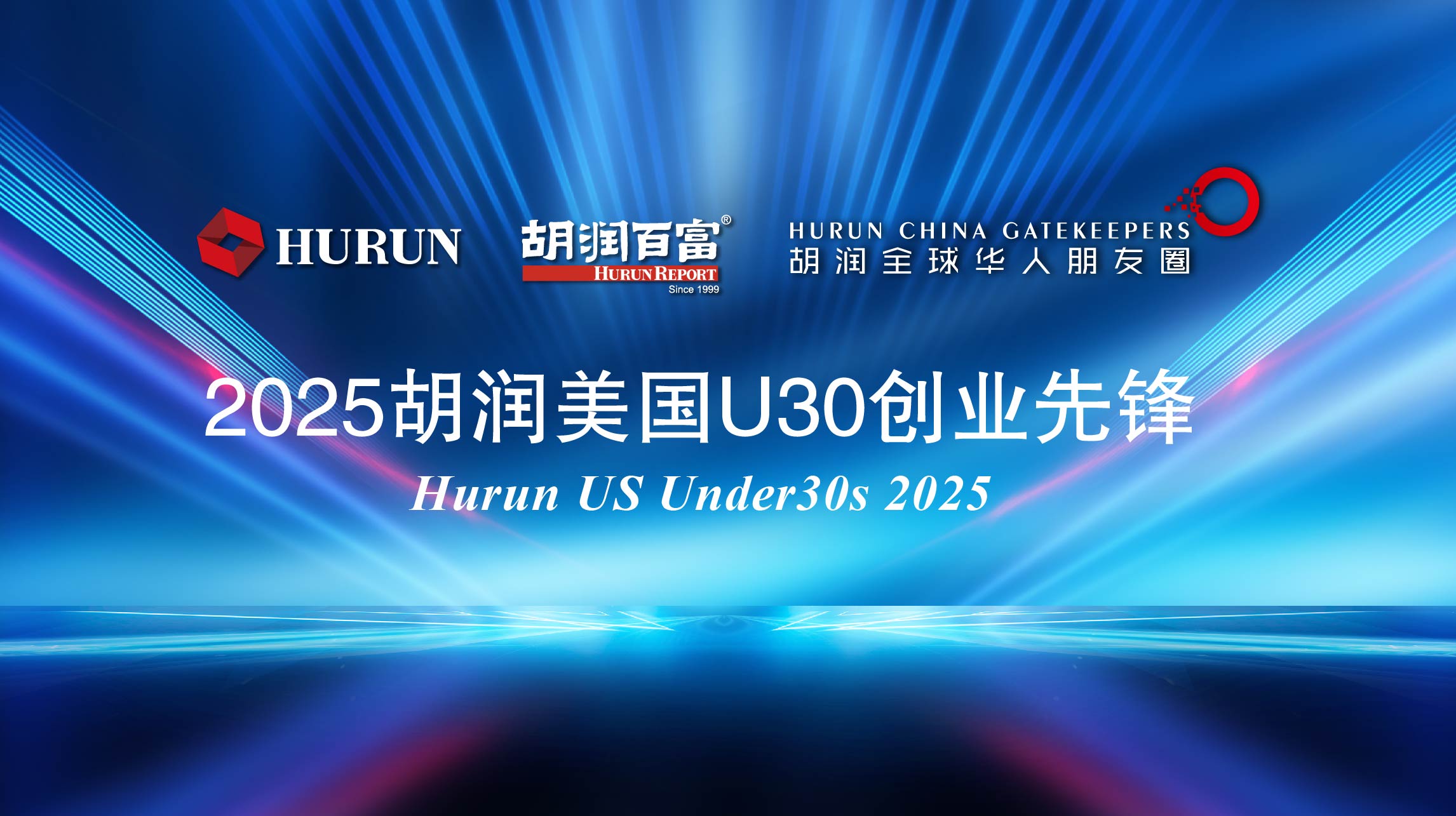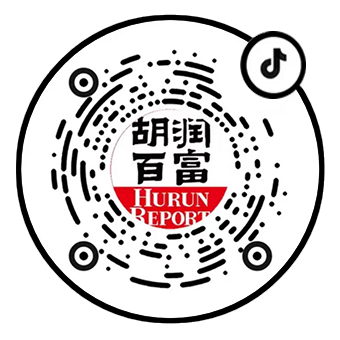Global Unicorn Index 2025
The Hurun Research Institute today released the Global Unicorn Index 2025, a ranking of the world’s unicorns, defined as start-ups founded in the 2000s, worth at least a billion dollars and not yet listed on a public exchange. The cut-off was 1 January 2025, with significant changes in valuation updated up to the date of release. Hurun Research has been tracking unicorns since 2017. This is the se
GLOBAL UNICORN INDEX 2025
IN SEARCH OF START-UPS FOUNDED AFTER 2000, WITH A VALUATION OF US$1BN AND NOT YET LISTED ON A PUBLIC EXCHANGE.
HURUN RESEARCH FINDS 1523 UNICORNS IN THE WORLD, NEW WORLD RECORD, UP 5% OR 70 UNICORNS.
203 UNICORNS NEWLY MINTED, ONE EVERY TWO DAYS, LED BY USA WITH 108, CHINA WITH 36, AND ‘REST OF WORLD’ WITH 59.
USA LED WITH 758 UNICORNS, UP 55, ACCOUNTING FOR 49.8% OF WORLD TOTAL. CHINA SECOND WITH 343, UP 3, FOLLOWED BY INDIA WITH 64, DOWN 3 AND THE UK WITH 61 UNICORNS, UP 8.
EU COUNTRIES 112 UNICORNS, UP 3.
4, UP 1, ARE ‘THUNDERBIRDS’ OR ‘HECTOCORNS’, WORTH MORE THAN US$100BN.
SPACEX BECOMES MOST VALUABLE UNICORN IN THE WORLD FOR FIRST TIME, ADDING US$170BN TO US$350BN.
CHATGPT OWNER OPENAI SAW FASTEST VALUATION INCREASE FOR SECOND CONSECUTIVE YEAR, UP US$200BN TO SECOND PLACE WITH US$300BN. TWO YEARS AGO, OPENAI WAS WORTH ONLY US$20BN.
TIKTOK AND DOUBAO AI ASSISTANT OWNER BYTEDANCE LOST TITLE OF WORLD’S MOST VALUABLE UNICORN, DROPPING TO 2ND PLACE, DESPITE ADDING US$80BN TO A VALUATION OF US$300BN.
ELON MUSK-LED XAI BROKE STRAIGHT INTO 4TH PLACE, AFTER ACQUISITION OF X, WITH A VALUATION OF US$115BN. MUSK FOUNDED OR CO-FOUNDED THREE OF THE FOUR MOST VALUABLE UNICORNS IN THE WORLD.
64, UP 5, ‘GRIFFINS’ OR ‘DECACORNS’ WORTH US$10BN OR MORE
CLAUDE OWNER SAN FRANCISCO–BASED ANTHROPIC UP MORE THAN TEN-FOLD TO 8TH PLACE AND A VALUATION OF US$62BN. FOUR OF THE TOP 10 UNICORNS HAVE LEADING AI ASSISTANTS: CHATGPT, DOUBAO, GROK, AND CLAUDE.
LONDON–BASED ONLINE BANK REVOLUT UP US$27BN TO BREAK INTO TOP 10 WITH VALUATION OF US$45BN.
BIG VALUATION INCREASES INCLUDE DALLAS-BASED GENETIC ENGINEERING PLATFORM COLOSSAL BIOSCIENCES UP OVER 1000 PLACES TO TOP 60 WITH US$10BN VALUATION, NVIDIA-FUNDED CLOUD PROVIDER COREWEAVE WORTH US$19BN, SWEDEN-BASED FINTECH KLARNA, UK-BASED BLOCKCHAIN AND US-BASED DEFENCETECH ANDURIL.
64 ‘PROMOTED’ OUT OF HURUN UNICORNS, OF WHICH 34 IPO (19 FROM CHINA, 9 FROM US, 6 FROM ‘REST OF WORLD’) AND 30 ACQUIRED, MAINLY FROM SOFTWARE & SERVICES, AI, FINTECH, AND BIOTECH. BIGGEST IPOS IN THE LAST YEAR INCLUDED COLD STORAGE STARTUP LINEAGE, WHICH RAISED OVER US$5BN, AND INDIA FOOD DELIVERY SWIGGY, WHICH RAISED OVER US$1BN.
BIGGEST DROPS IN VALUE. CHINA’S FAST-FASHION PLATFORM SHEIN DOWN US$15BN, AS CONCERNS GREW OVER ITS SUPPLY CHAIN OPERATIONS AND LABOUR PRACTICES, AND AUSTRALIA-BASED GRAPHIC DESIGN PLATFORM CANVA, DOWN US$13BN AFTER A LARGE SECONDARY MARKET SALE OF SHARES.
52 ‘DEMOTED’ FROM UNICORN STATUS, WITH VALUATION DIPPING BELOW US$1BN, LED BY 19 FROM THE USA AND 11 FROM CHINA. LARGEST BANKRUPTCIES WERE SWEDISH BATTERY MAKER NORTHVOLT, VALUED LAST YEAR AT US$20BN, AND CHINA-BASED E-CAR MAKER HOZON, LAST YEAR VALUED AT US$4.2BN.
FINTECH LEADS WITH 197 UNICORNS, FOLLOWED BY SAAS WITH 151 AND AI WITH 128. TOP THREE SECTORS MADE UP 31% OF UNICORNS.
USA UNICORNS IN SAAS, FINTECH, AND HEALTHTECH; CHINA UNICORNS SEMICONDUCTORS, AI AND NEW ENERGY, WHILST ‘REST OF WORLD’ FINTECH, E-COMMERCE, SAAS AND BLOCKCHAIN.
POLAND, BANGLADESH AND IRAN ARE THE LARGEST ECONOMIES WITHOUT A UNICORN.
SAN FRANCISCO WORLD’S UNICORN CAPITAL WITH 199 UNICORNS, UP 9, FOLLOWED BY NEW YORK WITH 142, UP 9, AND BEIJING WITH 75. WITHIN CHINA, SHENZHEN FASTEST GROWING CITY FOR UNICORNS, FOLLOWED BY HEFEI AND CHONGQING.
TIGER GLOBAL MANAGEMENT RETAINS THE CROWN OF ‘WORLD’S MOST SUCCESSFUL UNICORN INVESTOR’ FOLLOWED BY SOFTBANK, AND SEQUOIA CAPITAL RANKING THIRD.
TOTAL VALUE OF UNICORNS IN WORLD US$5.6TN, UP 22%
AVERAGE AGE OF UNICORN IS 10.6YRS
ON AVERAGE, UNICORNS HAVE TWO FOUNDERS AGED 46 YEARS OLD
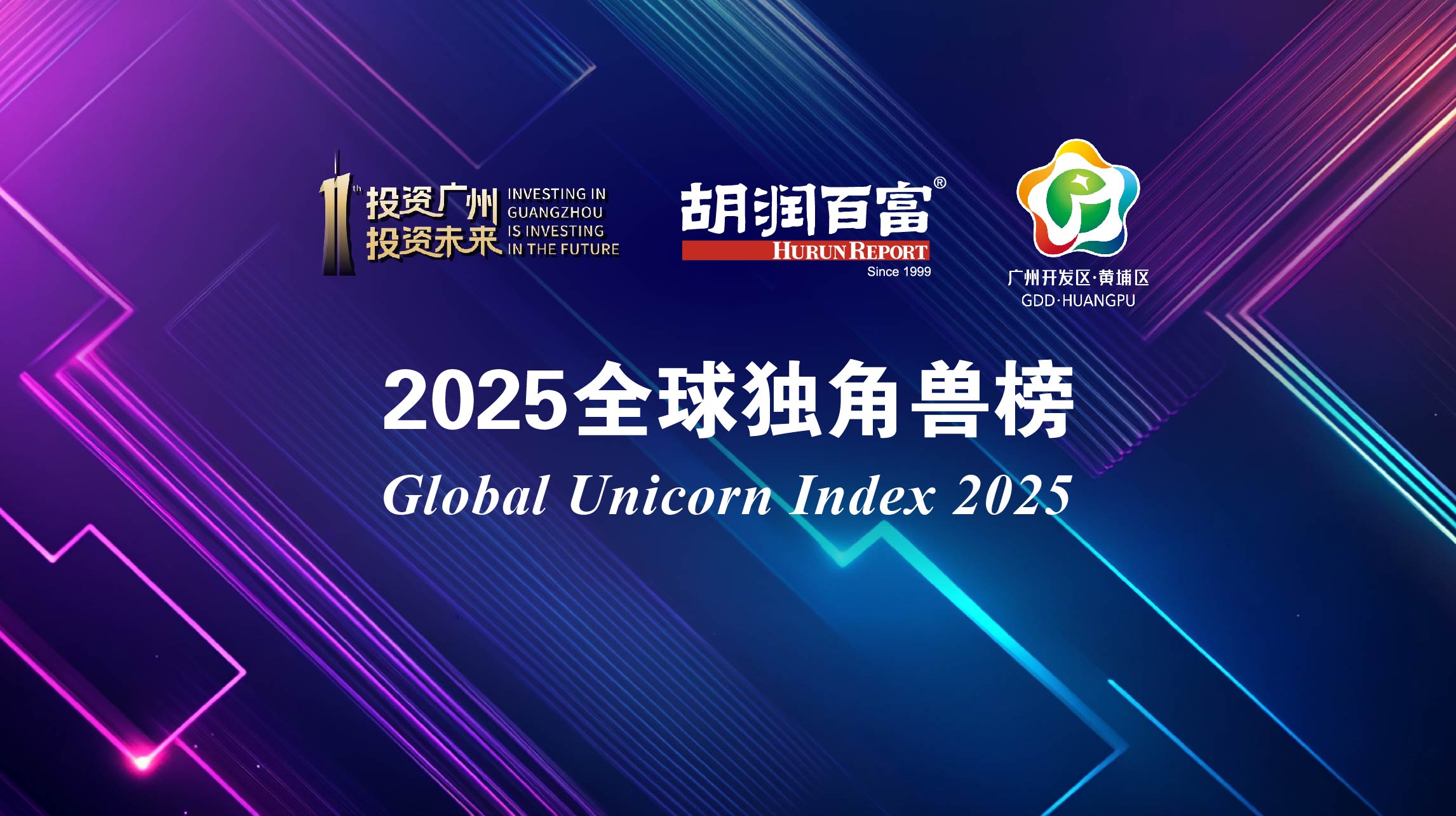
(26 June 2025, Guangzhou, Mumbai, and London) The Hurun Research Institute today released the Global Unicorn Index 2025, a ranking of the world’s unicorns, defined as start-ups founded in the 2000s, worth at least a billion dollars and not yet listed on a public exchange. The cut-off was 1 January 2025, with significant changes in valuation updated up to the date of release. Hurun Research has been tracking unicorns since 2017. This is the seventh year of the Global Unicorn Index.
This report includes the Most Successful Unicorn Investors in the World 2025, a ranking of the investment houses that have invested in the most unicorns.
Hurun Research found 1,523 unicorns in the world, based in 52 countries and 307 cities. 359 unicorns saw their valuations rise, of which 203 were new faces. 143 saw their valuations drop, of which 52 were ‘demoted’ as their valuation no longer cut US$1bn. 64 were ‘promoted’ out of the list, of which 34 went IPO and 30 were acquired. 1,073 saw no change to their valuations. Their total value was US$5.6tn.
The world’s unicorns are disrupting financial services, business management solutions and healthcare. 77% sell software and services, led by FinTech, SaaS, and AI, whilst 23% have a physical product, led by Semiconductors, New Energy, Biotech, and HealthTech.
Hurun Chairman and Chief Researcher Rupert Hoogewerf said:
“It's astonishing that even with an economic slowdown and global uncertainties, the US still added a new unicorn every 3 days, China one every ten days, whilst the Rest of the World, with over three quarters of the world’s population, only managed one new unicorn every six days. Despite the 203 new unicorns found this year, it is still a far cry from the heyday of 2021, when we found 700 new unicorns.”
“The last five years have been a golden era for entrepreneurship. The number of unicorns worldwide has tripled from around 500 in 2019 to over 1,500 today. Likewise, the count of countries with at least one unicorn more than doubled from 24 to 52, and the cities hosting them tripled from 118 to over 300. This explosion of high-value startups signals an unprecedented diffusion of innovation around the world. We have never seen technology and entrepreneurship spread across the globe at such a pace.”
“2025 has been the year of AI. Since the launch of ChatGPT in November 2022, AI startups have rocketed, marking a critical inflexion point. Today, nearly a third of the world’s unicorns are AI-related, underscoring its transformational impact across industries. Big Data, SaaS, and FinTech remain the most common sectors for AI-themed unicorns, whilst 128 are pure-play AI companies with a combined valuation nearing US$1 trillion, spanning AI assistants to machine learning platforms, and sector-specific AI applications in healthcare, security, robotics and fintech.”
“Why are there so many unicorns in the world today? One of the reasons is that there have been relatively few IPOs in the last year, just over 30, especially compared with the high point of 2021, when over 130 unicorns went IPO. High interest rates and global economic uncertainties have combined to dampen the appetite for large listings. Ironically, record-high stock markets in the US, India and the UK have not translated into many unicorn IPOs. Another factor is a growing crowd of 'perennial' unicorns, the proverbial bridesmaids that never get to be the bride. In other words, they achieve billion-dollar valuations but can’t take that final step to an IPO.”
“SpaceX has become the world’s most valuable unicorn, with a staggering US$350 billion valuation, ahead of TikTok-owner ByteDance and OpenAI. It’s the first time a space exploration company has led the pack.”
“No company encapsulates the 2020s unicorn boom quite like OpenAI. Two years ago, OpenAI was valued at just US$20 billion; today, it’s US$300 billion. That jump in valuation in just two years is the fastest we’ve ever seen, driven by the revolutionary potential of generative AI. It shows how, when a technology like AI captures imaginations, investor enthusiasm can reprice a startup virtually overnight into one of the world’s most valuable private companies.”
“Elon Musk’s new venture xAI burst onto our list straight into fourth place worldwide, valued at US$115 billion after acquiring social media platform X. It’s unprecedented for a startup to debut among the Hurun Top Five like this.”
“Some founders don’t stop at one unicorn. With xAI, Musk is now the founder or co-founder of three of the world’s four most valuable unicorns, as well as Neuralink (US$8bn) and The Boring Company (US$7bn) – a testament to how one visionary entrepreneur can repeatedly create massive value in completely different industries. Five have founded three unicorns and 33 have founded two.”
“FinTech is the main sector for unicorns right now, leading with just under 200, worth more than US$800 billion. By valuation, FinTech accounts for the largest share of the global unicorn pie (around 15% of total value). These startups are fundamentally reshaping financial services – from digital payments and lending to trading platforms – and they're doing it on a global scale, with major contributions from the US, UK, China and India. FinTech’s dominance underscores how finance is being reinvented by tech entrepreneurs.”
“SaaS, especially enterprise software, has firmly established itself as the second-largest source of unicorns, with over 150 companies valued at just under US$500 billion. These software-as-a-service unicorns are the backbone of modern business operations, providing everything from cloud collaboration tools to industry-specific solutions. While the US is home to many of them, countries like Germany, Australia and India are also carving out niches in this space, showing SaaS is a global phenomenon.”
“Renewable Energy has become a significant theme among unicorns, with 50 unicorns together valued at over US$130 billion. China leads the charge in this sector, from battery makers to EV infrastructure, but we’re also seeing rapid innovation from startups in the US, UK, and Israel. This wave of green-tech unicorns signals that the global climate agenda is fueling a new generation of high-value startups aimed at sustainability.”
“HealthTech has emerged as a critical sector for unicorn innovation, with just over 100 health-focused unicorns worth a combined US$220 billion. These startups are tackling some of the world’s biggest healthcare challenges, from telemedicine and medical devices to AI-driven drug discovery. While the US still dominates HealthTech, China and Europe are fast catching up. The growth of HealthTech unicorns shows investors’ confidence that technology can transform global healthcare delivery and outcomes.”
“One striking insight is how heavily weighted unicorns are towards intangible products. 77% of the world’s unicorns are selling software or services, whereas only 23% are centered around physical products. The software-dominated unicorns span FinTech, SaaS, AI, and more, whereas the product-based unicorns tend to be in areas like semiconductors, new energy, biotech, and hardware. It underscores that in today’s economy, digital innovation is the primary driver of ultra-high-growth businesses.”
“When it comes to unicorns, the world can essentially be split into three regions: the US, China, and the Rest of the World. The US accounts for half of all unicorns, China a quarter, and the remaining quarter is spread across dozens of other countries, led by India and the UK. Surprisingly, perhaps, the EU countries together have just over 112 unicorns, less than 8%, despite contributing to 20% of the world’s GDP. Each region has its strengths – American unicorns are heavy in SaaS, FinTech and AI, China’s in AI, Semiconductors and Renewable Energy, while the rest of the world leans towards FinTech and E-commerce – reflecting different regional innovation focuses.”
“The United States is in a league of its own with 758 unicorns – fully 50% of the world’s total. California alone is home to 396 companies valued at a combined US$2.1tn. The East Coast, led by New York with 141 unicorns, Massachusetts with 44 unicorns and Florida with 15 unicorns, continues to thrive in FinTech, Healthcare, and Enterprise Software. The Midwest, while smaller in count, shows growth in states like Illinois, with 15 unicorns, and demonstrates increasing startup momentum beyond coastal hubs. States like Texas, with over 32 unicorns, Colorado and Washington are emerging as strategic tech centres, boosted by talent migration and business-friendly environments. This dispersion indicates a maturing innovation landscape where startup ecosystems are flourishing across diverse regions, not just Silicon Valley.”
“San Francisco remains the world’s unicorn capital, leading by a wide margin, followed by New York. Beijing and Shanghai were third and fourth. Outside of the US and China, London has the highest concentration of unicorns, trailed by Bengaluru, Paris and Berlin. It’s a reminder that the unicorn boom is not confined to one region – while Silicon Valley and Beijing dominate, innovation thrives in many corners of the world.”
“The Gulf region is finally on the unicorn map with 7 unicorns. The UAE leads the Middle East with 5 unicorns, and Saudi Arabia celebrated its first two unicorns this year. For a region long known for oil wealth, the rise of homegrown tech unicorns signals a new era – one where the Gulf’s investment might and entrepreneurial ambitions are creating a budding startup ecosystem. I suspect this is just the start of the Middle East’s entry into the global startup scene.”
“SouthEast Asia continues to gain ground in the unicorn landscape with 37. Singapore leads the region with 18 unicorns, followed by Indonesia with 8, Vietnam with 4, Thailand and the Philippines with 3 each, and Malaysia with 1. This is a positive sign that ASEAN economies, with their population of over 600 million, are nurturing more high-value startups. From e-commerce to fintech, it’s a clear indication that SouthEast Asia’s tech ecosystem is rapidly maturing.”
“Tiger Global Management is the world’s most successful unicorn investor for the second year running, with stakes in just under 200 of the unicorns on the Hurun Index. This year, Sequoia Capital overtook Hongshan for third spot. It goes to show the outsized role that a handful of visionary investors play – they truly are the “entrepreneurs behind the entrepreneurs,” providing the rocket fuel for so many unicorns.”
“64 unicorns left our index this year by 'graduating' to the public markets or getting acquired. Despite a slowdown in the domestic economy, Chinese companies dominated unicorn IPOs last year. Of the 34 unicorns worldwide that went public, 19 were from China, far ahead of the US, which had just 9, and 6 from the Rest of the World. Most of the unicorns that went IPO came from sectors like software, AI, FinTech and BioTech, indicating those fields are maturing.”
“143 companies faced valuation cuts, and 52 were ‘demoted’ after falling below the US$1 billion mark. This shift was led by the US with 19 such ‘demotions’ and China with 11. Among the biggest drops were Sweden’s battery maker Northvolt, once valued at US$20 billion, and Chinese EV maker Hozon, previously at over US$4 billion. Even top names were hit – fast fashion giant Shein lost US$15 billion in value, while Australia’s Canva saw a US$13 billion drop. These declines serve as a reminder that private valuations are fluid, and no company is immune to changing market conditions.”
"We saw some newcomers skyrocket up the ranks from obscurity. A prime example is Colossal Biosciences, a Dallas-based genetic engineering startup working on de-extinction – it jumped over 1,000 places to become a US$10 billion unicorn. Another is cloud provider CoreWeave, valued at US$19 billion after backing from major players, and which has since gone IPO with a market cap today of over US$80bn! Such huge leaps in valuation for cutting-edge companies show how quickly novel ideas can capture investor attention and massive funding.”
“Europe isn’t entirely left out of the unicorn story – London-based fintech Revolut, for instance, shot up by US$27bn to a US$45 billion valuation, cracking the Hurun Top 10. It proves that groundbreaking startups can emerge outside the US and China duopoly. Others include Sweden-based buy now pay later platform Klarna, more than doubling to US$14bn. Revolut and Klarna’s rises underline the strength of FinTech as a sector and Europe’s ability to compete with the Silicon Valley giants.”
“Interestingly, about 5% of the unicorns on our index began life as corporate spin-offs. Ant Group is a prime example – it was spun out of Alibaba’s Alipay in 2004 and went on to become a FinTech giant. This year, we have Yinwang, spun off from Huawei, and DCar, spun off from ByteDance, whilst Zeekr, a spin-off from Geely, went IPO. We’ve seen several electric vehicle makers and tech ventures follow a similar path, incubating within large companies before launching independently. The majority of these spin-off unicorns have come from China, highlighting how big corporations there are fostering innovation from within.”
“The startups on the Global Unicorn Index took six years on average to get to unicorn status. The average founder is 46 years old, and there are two founders per unicorn. This might surprise those who think of unicorns as a young person’s game. In reality, building a billion-dollar business often takes at least a decade of hard work, and it's frequently led by serial entrepreneurs who have honed their craft over many years. In many cases, these so-called overnight successes required years of iteration and learning to get there.”
“Some unicorns are hard to pin down with a valuation, such as Hangzhou-based AI assistant DeepSeek, which has not commercialised its platform, and not-for-profit communications platform Signal. Neither of these startups are on this year’s Hurun Unicorn Index.”
“Indian and Chinese entrepreneurs continue to play a major role in unicorn creation beyond their home countries. Indians co-founded over 130 unicorns abroad, over 90% in the US, with a handful in the UK and Germany. Among the largest are San Francisco-based Databricks (US$62bn), design platform Figma (US$12.5bn) and AI-native search startup Perplexity AI (US$9bn). On the Chinese side, just under 50 unicorns were founded by Chinese outside of China, led by Binance (US$35bn), Airtable (US$11bn) and both Aesc and Notion Labs, each worth US$10bn. These diaspora-driven ventures underscore the global nature of talent and capital in shaping the modern startup ecosystem.”
“Tax plays an important part in registration of unicorns. In the US, Delaware is popular, whilst low-tax havens such as Singapore and Dubai play an important role for South East Asian and Middle East startups. Offshore centers like the Cayman Islands, BVI and Seychelles, also play their part.”
“FutureTech. The Hurun Unicorn Index is beginning to reflect the rise of emerging industries such as quantum computing, fusion energy, hydrogen and neurotechnology. Companies like Benyuan Quantum Computing, Xanadu, SandboxAQ, Neo Fusion, Helion Energy, Neuralink and MindMaze signal a shift towards cutting-edge science and deep tech. The valuations are still relatively small, with Neuralink the most valuable at US$8bn, and US-based fusion energy company Helion Energy doubling in value to US$5.4bn. Expect these industries to create US$100bn businesses soon.”
“We have added in two new animals to our ‘unicorn zoo’: Thunderbird and Griffins. There are 64 Thunderbirds, startups worth US$10bn, and 4 Griffins, startups worth US$100bn. These combine with our future unicorn animals of Cheetahs and Gazelles, with Cheetahs most likely to ‘go unicorn’ within five years and Gazelles, most likely to ‘go unicorn’ within three years. So, it goes Cheetahs, Gazelles, Unicorns, Thunderbirds and Griffins.”
“The number of unicorn companies currently based in Guangzhou is 24, and it is the same as last year but with significant changes behind the number. This year, WeRide and Pony.ai are no longer on the list after going public. WeRide became the world's first stock of general-purpose autonomous driving company, with a valuation of RMB 16 billion. Pony.ai was known as the first publicly listed autonomous ride-hailing company, with a valuation of RMB 34 billion. Meanwhile, Guangzhou welcomed two newcomers to the unicorn ranks: AscenPower, a manufacturer of automotive-grade silicon carbide chips, and Quwan, an innovative tech firm integrating interest-based social networking, AI, and esports. As a result, Guangzhou is still home to 24 unicorn companies, ranking 11th globally and 4th among Chinese cities. This is comparable to the combined total of unicorns in South Korea and Japan (27), and close to Boston (25) and Berlin (21), nearly double that of Los Angeles (14). Unicorn companies are a hallmark of a world-class entrepreneurial ecosystem. A higher number of unicorns indicates stronger innovation capacity and a more mature entrepreneurial ecosystem in a country. Guangzhou's success stories of unicorns going public and becoming industry benchmarks, coupled with the rise of new unicorns, demonstrate that Guangzhou has a solid industrial foundation and a rich innovation ecosystem, making it an ideal city for unicorns to thrive.”
According to a representative of the Guangzhou Municipal Investment and Development Commission, Guangzhou is stepping up efforts to build itself into a national advanced manufacturing hub by prioritizing industry and strengthening its manufacturing sector. The city is accelerating the development of the "12218" modern industrial system, with a focus on 15 strategic industrial clusters such as intelligent connected vehicles and new energy vehicles, six future-oriented industries including embodied intelligence, and eight modern service sectors such as modern finance. Over the next five years, Guangzhou aims to create one one-trillion-yuan-level cluster, four 500-billion-yuan-level clusters, and four 300-billion-yuan-level clusters, driving strategic industries to surpass RMB 6 trillion in scale. Furthermore, Guangzhou is continuously strengthening its role as an international center of innovative technology, enhancing its capabilities to foster "2+2+N" technology innovation platforms, as well as building the National University Regional Technology Transfer and Transformation Center (Guangdong-Hong Kong-Macao Greater Bay Area) and four achievement transformation bases surrounding Wushan, Guangzhou Higher Education Mega Center, Sun Yat-sen University, and HKUST(GZ). Through these efforts, Guangzhou aims to create a "rainforest" ecosystem for industrial and technological innovation that incubates more unicorn companies and empowers them to go global.
Officials from Guangzhou Development District / Huangpu District have stated that:
“Between 2022 and 2024, Guangzhou Development District / Huangpu District, in partnership with Hurun Report, hosted the Global Unicorn CEO Conference and published the Global Unicorn List for three consecutive years, solidifying the District's reputation as the ‘City of Unicorns’.”
“In 2025, Guangzhou Development District / Huangpu District has the highest number of unicorn companies among all districts in Guangzhou, a figure comparable to that of Australia and Switzerland. On one hand, the unicorns listed from the District are characterized by both ‘large quantity and high quality’, with a significant proportion coming from strategic emerging industries. On the other hand, unicorn companies like WeRide, SmarterMicro, and others that previously made it to the list have now successfully gone public, demonstrating fast growth momentum.”
“In recent years, Guangzhou Development District / Huangpu District has spared no effort in supporting the growth and success of unicorn companies. First, it has enhanced the industrial ecosystems. The District has launched large-scale, structured, and full-chain investment initiatives focused on strategic emerging and future industries, establishing a nurturing chain for technology enterprises, from startups to high-tech enterprises, gazelle companies, unicorns, and billion-level high-tech enterprises. These efforts have promoted collaborative development of small, medium, and large enterprises while facilitating synergies across upstream and downstream segments. Second, the District has strengthened its innovation platform infrastructure. It created China's first ‘SMEs Can Achieve Great Things’ innovation demonstration zone and is building a ‘2+3+N’ strategic cluster of technology innovation platforms, including the Guangdong-Hong Kong-Macao Greater Bay Area National Center for Technological Innovation, attracting over 1,000 research institutions. The R&D investment as a proportion of GDP is 6.8%, which ranks at a world-class level. Third, the District has enhanced multi-dimensional factor empowerment. It has developed an investment and financing system that includes investment by state-owned enterprises, guidance from industrial funds, and the participation of social capital, and established a RMB 5 billion innovation fund. Additionally, it has built the Hurun Center, introduced various financial services, innovative enterprises, and other resources, and established two specialized industrial parks: the Jingguang Collaborative Innovation Center and Junheng Plaza, providing over 30 million square meters of premium industrial space. Furthermore, the District has established a scenario-based opportunity list to accelerate industrial applications such as AI, autonomous driving, and hydrogen storage, all while leveraging the annual fixed-asset investment of over RMB 200 billion across the District.”
Stock Markets and Currencies.
In the year to 1 January 2025, stock markets generally performed well, with notable gains across major indices. In the US, the Nasdaq rose 31%, and the S&P 500 gained 25%. In Europe, Germany’s DAX jumped 19%, the EURO STOXX 50 climbed 8%, and the Paris-based Euronext 100 was up 4%. Hong Kong’s Hang Seng Index was up 18%, marking a recovery from the previous year, whilst Shanghai and Shenzhen were up 13% and 9%. India's Sensex was up 9%.
The US dollar strengthened slightly against most major currencies during the same period. It rose 6% against the euro, 3.2% against the Chinese yuan, 2.6% against the Indian rupee, and 1.3% against the British pound. The largest rise was against the Turkish lira, surging 19%, followed by an 18% increase against the Russian ruble and a 14% rise against the South Korean won.
Bitcoin surged 130% over the year. In contrast, crude oil (WTI) declined slightly by 0.4%, indicating a relatively stable energy market.
Top 10 Unicorns in the World
SpaceX overtook ByteDance for the Number One Unicorn in the World.
Three new entrants joined the Hurun Top 10 this year: San Francisco-based social media and artificial intelligence platform xAI, artificial intelligence assistant firm Anthropic, and London-based fintech Revolut, replacing Canva, Webank, and Binance, which have dropped to the Top 20.
The cut-off to make the Hurun Top 10 was US$45bn, up US$12bn.
This year’s Hurun Top 10 made up 26% of the total value of the world’s unicorns and added US$554bn, making up almost 80% of all the new value added in the year. Their total value rose to US$1.4 trillion.
USA companies now make up 6 of the Top 10, up 1, China 3, down 2, and the UK with 1.
Table 1: Global Unicorn Index 2025 TOP 10
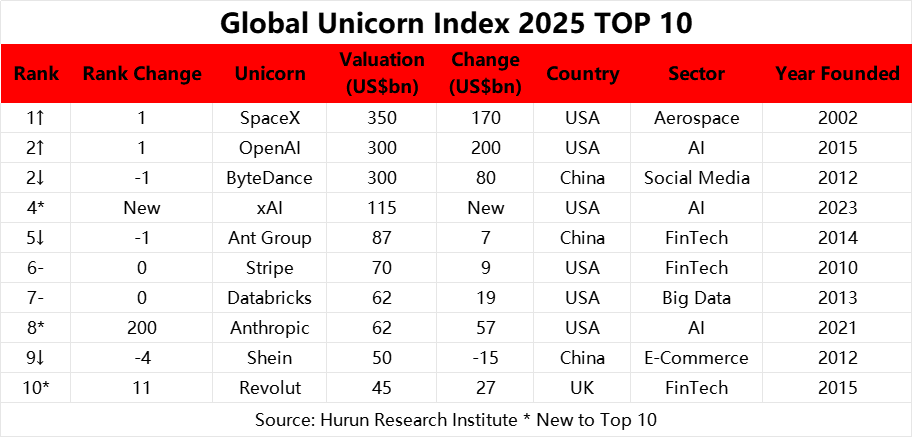
Founded in 2002, Hawthorne-based SpaceX shot up US$170bn to take top spot with a valuation of US$350bn. This year saw SpaceX continue to expand its Starlink satellite constellation, reduce global cellular dead zones, and progress through its Starship test-flight programme.
Founded in 2015, San Francisco-based OpenAI added US$200bn to reach a valuation of US$300bn, rising one place to second. OpenAI consolidated its leadership in generative AI by productising GPT-4, rolling out multilingual voice assistant Sora, and securing fresh partnerships across tech and enterprise. Despite rising competitors from the likes of China’s DeepSeek and Google’s Gemini, Sam Altman has continued to raise money and made acquisitions, including a May 2025 US$5bn acquisition of io, set up by former Apple employee John Ive.
Founded in 2012, Beijing-based ByteDance eased back one rung to second despite a US$80bn gain to US$300bn. ByteDance continued to diversify beyond social media, scaling its e-commerce operations and pushing into cloud gaming even amid regulatory headwinds in the US. Its in-house AI initiative, Doubao AI, has also gained significant market share in China’s generative AI space, despite the rapid ascent of competitors like DeepSeek.
Founded in 2023, the youngest of the Hurun Top 10, San Francisco-based xAI stormed into the rankings as a new entrant at US$115bn. Elon Musk’s AI startup made waves with the release of Grok and announced plans for a dedicated AI computing centre in Texas. The valuation surge was driven by a mega-merger between Musk’s social media platform X and his AI venture xAI, consolidating resources, data and talent to create a unified ecosystem across social, infrastructure, and AI capabilities.
Spun out of Alibaba in 2011, Hangzhou-based Ant Group dropped down one place to fifth with a valuation of US$87bn, up US$7bn. Ant’s latest quarterly results showed pressure on overseas investment valuations, though its digital payments and micro-lending platforms maintain strong transaction volumes.
Founded in 2010, San Francisco-based Stripe held sixth place with a valuation of US$70bn, up US$9bn. Stripe extended its global footprint by launching localised payment rails in Latin America and reported record growth in annualised revenue run-rate.
Founded in 2013, San Francisco-based Databricks stayed in seventh place at US$62bn, up US$19bn. Databricks closed a US$500mn funding round and saw its annual recurring revenue climb by over 50 per cent, driven by demand for unified analytics and AI platforms.
San Francisco-based Anthropic was up over ten-fold to US$62bn, shooting up 200 places straight into eighth place. The AI safety-focused startup gained strong traction with the launch of its Claude 3 model and grew its business by offering customised AI solutions for companies. Hard to believe that, despite being founded only in 2021, it is still only the ]second youngest of the Hurun Top 10 after xAI.
Founded in 2012, Guangzhou-based Shein slipped four places to ninth with US$50bn, down US$15bn, as it navigated supply-chain and sustainability challenges. Shein is said to be looking for a listing in HK or London.
Founded in 2015, London-based Revolut broke into the Top 10 after jumping US$27bn, hitting a valuation of US$45bn. Revolut expanded its banking licence portfolio across Europe, rolled out crypto trading features and surpassed 30 million global users.
Where are the World’s Unicorns based?
The world’s unicorns come from 52 countries, an increase of 120% from 2019, spread around 307 cities, an increase of 160% from 2019, and up from 291 from last year.
The USA led with 758 unicorns, followed by China with 343. The Rest of the World had 422, led by London and Bengaluru, followed by Paris, Berlin, Singapore and Seoul.
The main sectors of USA-based unicorns were SaaS, FinTech, and HealthTech, with HealthTech replacing AI as a leading industry. For China, it was Semiconductors, AI, and New Energy, whilst for the Rest of the World, it was FinTech, E-commerce, and Blockchain, with Blockchain emerging as a new addition this year.
Nigeria and Saudi Arabia broke into the Top 30 countries. Cambridge (US), Toronto, San Jose, and Gurugram broke into the Top 30 cities at the expense of San Mateo, Redwood City, Seattle, Miami, Nanjing, Chengdu, Denver and Sunnyvale.
By USA state. California dominates the USA unicorn landscape with 395 companies valued at US$2.1tn, followed by New York with 141 companies (worth US$362bn), Massachusetts with 44 companies (worth US$100bn), and Texas with 32 (worth US$75bn). The next tier includes Washington with 17, and Illinois, Colorado and Florida with 15 each.
The Bay Area is a global epicenter of innovation and enterprise, home to 315 companies with a combined valuation of approximately US$1.7tn. Anchored by cities like San Francisco, Palo Alto, Mountain View, San Jose, and Berkeley, the region leads the world in high-impact sectors such as Artificial Intelligence (US$470bn), FinTech (US$231bn), SaaS (US$188bn), Cybersecurity, Blockchain, and Health Tech. Its unmatched concentration of talent, venture capital, and cutting-edge research makes the Bay Area the most influential and valuable business ecosystem globally, setting the benchmark for technology-driven growth and entrepreneurial success. The Chinese Greater Bay Area, centered around Shenzhen and Guangzhou, has 72 unicorns.
The European Union has 112, up 3, led by Germany with 36, driven by strengths in industrial tech and enterprise software, France with 30, supported by strong public-private innovation initiatives. Sweden, with 6, and Finland, with 4, contributed significantly from the Nordics. Luxembourg made the Top 30 countries with 2.
Southeast Asia continues to gain ground with 37, with Singapore leading the region at 18 unicorns, followed by Indonesia with 8, Vietnam with 4, Thailand and the Philippines with 3 each, and Malaysia with 1.
In the Gulf States, there are 7 unicorns, led by the UAE with 5 unicorns, whilst Saudi Arabia had its first two 2.
By city, San Francisco retained the title of ‘World Unicorn Capital’ with 199 unicorns, up 9, followed by New York with 142. In China, the fastest-growing cities were Shenzhen, Hefei and Chongqing. In the ‘Rest of the World’, it was Munich and Toronto.
Table 2: Countries and cities where the world’s unicorns are based
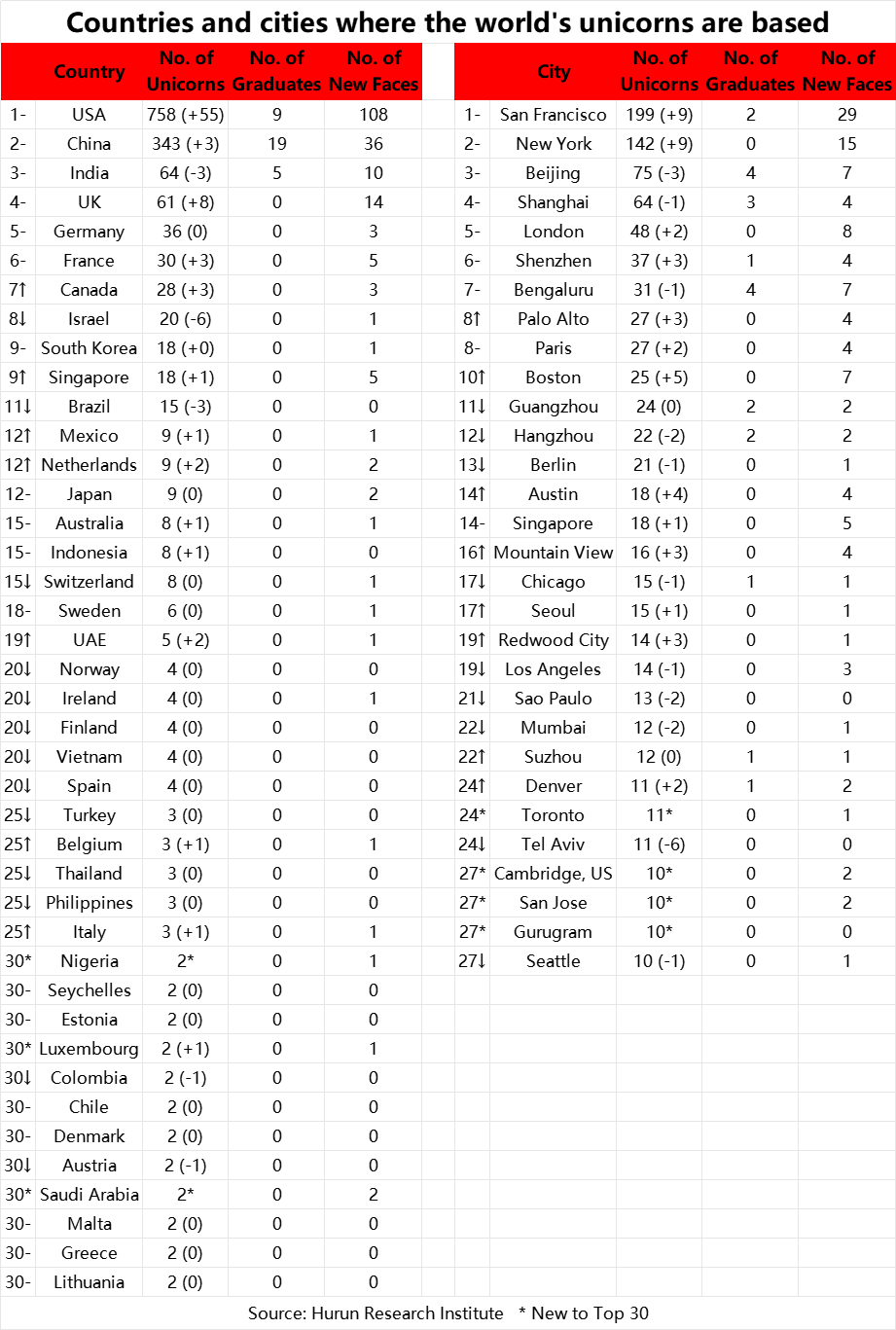
Key countries
The USA continues to set the pace for global startup innovation with a record 758 unicorns — half of the world’s total — adding 108 new faces in the past year alone. Valuations surged, led by SpaceX (US$350 billion) and OpenAI (US$300 billion), while Elon Musk’s xAI debuted at US$115 billion. The Bay Area remains the world's unicorn capital, home to 315 companies valued at US$1.7tn. Leading in SaaS, FinTech, AI, and HealthTech, US unicorns drove the global boom in innovation, whilst also gaining pace in new sectoral frontiers like quantum tech, fusion energy, and genetic engineering.
China was second with 343 unicorns, up only 3, partly because China had 19 successful ‘promotions’, ie, unicorns that went IPO, the most of any country in the world. There were 36 new faces, led by the likes of Wuhan-based advanced chip maker Yangtze Memory (US$22bn), Huawei spin-off smart car manufacturing platform Yinwang (US$16bn), data storage service provider xFusion (US$7.8bn) and ByteDance spin-off car information platform DCar (US$3bn). In the last five years, China’s unicorns have risen from 227 to 343, an increase of 116, despite 116 being promoted out of unicorns (only 6 of these were acquired, the rest going to IPO) and 108 being demoted. In this period, there have been 345 new faces. The high point was 2021, when there were 146 new faces and 41 promotions.
ByteDance, Zhejiang-based card trading Kayou, and Little Red Note grew fast. Leading the card collecting craze is Kayou, which saw its value supercharged tenfold to US$9.5bn. ByteDance grew US$80bn to a valuation of US$300bn, as it deepened its impact with video-sharing platforms Douyin, TikTok, and its AI assistant Doubao. Little Red Note’s video-sharing platform has surged in popularity, adding US$9bn to its valuation of US$26bn.
Large language models have had a good year in China, with Beijing-based Zhipu AI and Baichuan AI seeing a surge in valuations to US$3bn and US$2.7bn, respectively. Commercial space launcher Landspace was up US$1.2bn to a valuation of US$2.7bn.
Unicorns that went IPO in the last year were headed by the EV industry, led by EV maker Zeekr, a spin-off from Geely, car chip maker Horizon Robotics, and two autonomous driving software startups, Weride and Pony.ai. Chagee and Chabaidao led a boom in bubble tea brands, with current valuations of US$5bn and US$1.5bn.
There were two acquisitions in the year, logistics platform Cainiao was bought out by Alibaba and online doctor platform HaoDaiFu was bought by Ant. Two others are in the process of being acquired; Chengdu-based outdoor media platform Xinchao is being acquired by FocusMedia and Himalaya by Tencent.
India was third with 64 unicorns, led by discount broking start-up Zerodha worth US$8.2bn, followed by fantasy sports platform Dream11 worth US$8bn and Razorpay worth US$7.5bn. The top sectors are FinTech (US$45bn), E-Commerce (US$37bn), and Gaming (US$14bn). With 5 IPOs this year, the ecosystem shows momentum and growing global relevance. Indians co-founded a further 133 unicorns outside of India, over 90% in the US, with 3 in the UK and 2 in each of Singapore and Germany.
The UK boasts 61 unicorns worth US$213bn, led by Revolut (US$45bn), Blockchain (US$14bn), Checkout.com (US$9.4bn), Octopus Energy (US$9bn) and SumUp (US$8.9bn). There were 14 new faces, led by OnlyFans (US$8bn), Quantinuum (US$5.3bn) and Exohood Labs (US$3.7bn). FinTech dominates (US$116.6bn), followed by Blockchain (US$19.8bn) and Artificial Intelligence (US$13.6bn). No IPOs this year, but the UK remains a top tech and finance hub. 3 are headquartered offshore, of which 2 are in the Cayman Islands and 1 is in the BVI.
What industries do they come from?
FinTech, SaaS, and AI accounted for one-third of all unicorns on the list. New Energy overtook BioTech to eighth place.
Industries that have been most disrupted by unicorns in the past year were Financial Services, Business Management Solutions, Healthcare and Retail.
This year, 478 unicorns—nearly a third of the global list—are AI-related, reflecting the sector’s explosive cross-industry impact. Of these, 128 are considered AI companies, with the rest using AI to create value. These companies span foundational model builders, machine learning platforms, and AI applications across healthcare, robotics, security, and finance. The most common sectors among AI-themed unicorns include Big Data, FinTech, and SaaS. Notably, over half of them were founded within the past eight years, highlighting AI’s rapid commercial acceleration since 2016. While leading AI firms like OpenAI and Anthropic dominate headlines, many startups—especially in China and the US—are embedding AI into core enterprise and consumer platforms.
With 197 unicorns valued at over US$800bn, FinTech is still the leader of the global startup ecosystem. Dominated by the US, UK, China, and India, this sector spans everything from digital lending and online banks to payment gateways and trading platforms. Its influence is foundational, reshaping how financial services are accessed and delivered worldwide.
SaaS boasts 151 unicorns worth just under US$500bn, powering the backend of modern business. From enterprise tools and productivity platforms to industry-specific solutions, these startups offer recurring value at scale. While the US dominates, countries like Germany, Australia, and India are carving out strong niches.
E-Commerce counts 104 unicorns totaling over US$300bn, reflecting a permanent shift in global consumer behavior. Giants in China and the US drive this momentum, while emerging markets like India, Brazil, and Southeast Asia contribute to a more inclusive retail revolution across verticals like fashion, groceries, and marketplaces.
HealthTech now comprises 103 unicorns valued at over US$200bn, tackling global healthcare challenges with tech-driven solutions. The US remains dominant, but China and Europe are catching up fast. Innovations in telehealth, medical devices, and diagnostics signal a long-term investment trend with real-world impact.
Amid rising digital threats, 73 Cybersecurity unicorns have emerged with a combined value of just under US$200bn. This sector is mission-critical, led by the US and supported by active ecosystems in Israel, Canada, and the UK. Areas like threat detection, identity protection, and cloud security are seeing the highest growth.
Blockchain. Crypto exchanges led the valuations. Binance led the way with a valuation of US$35bn, and London cryptocurrency exchange Blockchain saw its valuation rise US$7 billion to US$14bn.
BioTech, with 47 unicorns worth just under US$100bn, is advancing the frontier of life sciences. Concentrated in the US, with strong clusters in China and Europe, this sector blends scientific breakthroughs with commercial ambition, spanning gene therapy, drug discovery, and molecular diagnostics.
Logistics holds steady with 45 unicorns worth just over US$100bn, reshaping global supply chains post-COVID. China anchors this segment, while India, the US, and Germany also play key roles. Innovations in freight, last-mile delivery, and AI-powered logistics are transforming how goods move.
Other Notable Sectors
Renewable Energy. China dominated with over half of the 63 renewable energy-related unicorns. China-based wind turbine maker Envision Energy added US$3bn to take its valuation to US$15bn. US-based fusion energy technology maker Helion Energy was up US$2.4bn to US$5.4bn. Chongqing-based EV maker Avatr made the list for the first time with a valuation of US$4.4bn.
Robotics is scaling rapidly, with 37 unicorns now in the space, particularly in humanoid robotics. Notable players include Hangzhou-based Unitree, which captured global attention with its dancing robots and a robot kickboxing match. Other unicorns include DJI (China), Agile Robots (Germany), and CMR Surgical (UK). Rising demand for automation in logistics, manufacturing, and healthcare is fuelling this surge, with companies like Bright Machines, AMP Robotics and Locus Robotics leading the way by integrating AI with hardware to boost efficiency and reduce reliance on human labour.
Semiconductors are seeing a sharp rise in unicorn activity, with China commanding over 90% of the 44 semiconductor-related unicorns globally. This dominance reflects the country's strategic push towards chip self-sufficiency amid rising geopolitical tensions. Leading the charge is Wuhan-based Yangtze Memory, the highest new entrant with a valuation of US$22bn. Shanghai-based Unisoc also joined the list for the first time at US$9.8bn, while Hefei’s Changxin Xinqiao, a key player in memory chip development, added US$1.5bn to reach a valuation of US$7.1bn. Outside China, only the United States and Singapore featured in this sector, highlighting how semiconductor innovation remains highly concentrated and politically sensitive.
Aerospace and the Low Earth Orbit (LEO) economy are emerging as frontier sectors for innovation and investment. While SpaceX remains the undisputed leader in this space, Amazon-backed Blue Origin (valued at US$20bn) and China's DJI (US$11.5bn), known for its dominance in drone technology, are also shaping the future of orbital and aerial technologies. China leads with two-thirds of all LEO-related unicorns, reflecting its growing ambitions in commercial spaceflight, satellite networks, and high-altitude surveillance. These companies are not only advancing launch capabilities but also enabling next-gen infrastructure for connectivity, earth observation, and autonomous navigation—marking the LEO economy as a critical domain for both economic opportunity and geopolitical influence.
Social Media. TikTok and Douyin owner ByteDance was the absolute leader, followed by Elon Musk’s xAI, which shot straight in with a valuation of US$115bn. Others of interest included Telegram, worth US$30bn, Shanghai-based Little Red Note, worth US$26bn, Francisco-based Discord, worth US$15bn, and new to the list, London-based OnlyFans, worth US$8bn.
Web3 is gaining serious traction, now home to 67 blockchain unicorns. Leading the pack is Fintech giant Revolut at US$45bn, followed by crypto exchange Binance at US$35Bn. London-based Blockchain doubled its valuation to US$14bn, with other major players including Ripple (US$11bn), Seychelles-based KuCoin (US$10bn), and San Francisco-based Alchemy (US$10bn). Despite ongoing regulatory uncertainty, investor interest in decentralised finance and Web3 infrastructure remains robust, reinforcing blockchain’s role as a foundation of the internet’s next evolution.
AR/VR/MR. Shanghai-based Mihoyo leads the global AR/VR/MR unicorn landscape with a valuation of US$25bn, driven by its hit game Genshin Impact and a strategy centred on deep, immersive worlds. Animoca Brands (US$1.5bn), despite a valuation drop, continues to champion digital ownership at the intersection of blockchain and gaming. South Korea’s Naver Z (US$1bn), developer of Zepeto, represents the social side of the metaverse, targeting younger audiences with custom avatars and virtual interactions. Together, these companies showcase the diversity of the AR/VR/MR space — from gaming and virtual worlds to web3 platforms — and highlight Asia’s growing leadership in the next generation of immersive consumer technology.
Future Tech is witnessing a surge in breakthrough companies across sectors like space, quantum, fusion, semiconductors, autonomous vehicles, and AI. Leading the charge is SpaceX, valued at US$350bn, followed by China's Yangtze Memory (US$22bn) and AI chipmaker Unisoc (US$9.8bn). In quantum, the UK’s Quantinuum (US$5.3bn) and the US-based PsiQuantum (US$3.2bn) are redefining computational power, while fusion innovators like Commonwealth Fusion (US$7.2bn) and Helion Energy (US$5.4bn) are racing to unlock clean energy. From neurolinks to low-Earth orbit, and from electric mobility to brain-computer interfaces, these unicorns represent the next wave of global deep tech—capital-intensive, R&D-driven, and strategically vital.
Table 3: Core Industries of the Unicorns
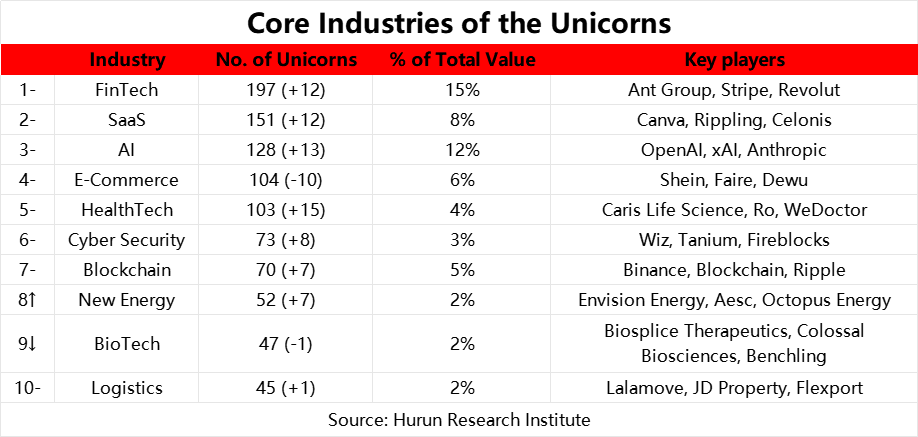
Who’s Up?
359 unicorns saw their valuation increase, of which 203 were new unicorns. The valuation increases and new unicorns came to US$1.4tn, of which new unicorns made up US$565bn.
Wiz secured new funding due to its explosive growth, innovative cloud security platform, and ability to address a critical need in securing complex cloud environments. With rapid adoption, US$350m in ARR, and smart acquisitions like Gem and Dazz, Wiz has continuously expanded its capabilities.
Colossal Biosciences, known for pioneering de-extinction science, recently announced a breakthrough with the introduction of a newly engineered extinct species—a genetic hybrid designed to restore lost ecological functions. Their latest creation underscores Colossal’s expanding capabilities in synthetic biology and conservation technology, attracting fresh funding and global attention.
The new unicorns came from the US (108), China (36), and the Rest of the World (59), led by San Francisco-based xAI, China-based Yangtze Memory, and UK-based OnlyFans.
The sectors that performed best were AI, Aerospace, Social Media and FinTech. Others of note included Cyber Security, Big Data, Cloud, BioTech and Retail.
By city, San Francisco led with 29 new unicorns, followed by NYC with 15, London with 8 Boston, Beijing & Bengaluru with 7 each, and Singapore with 5.
Of the 64 promotions from last year’s Global Unicorn List, China led with 19 IPOs, whilst the USA had 29, of which 9 were IPOs.
Table 4: Top 10 biggest rises in valuations in one year
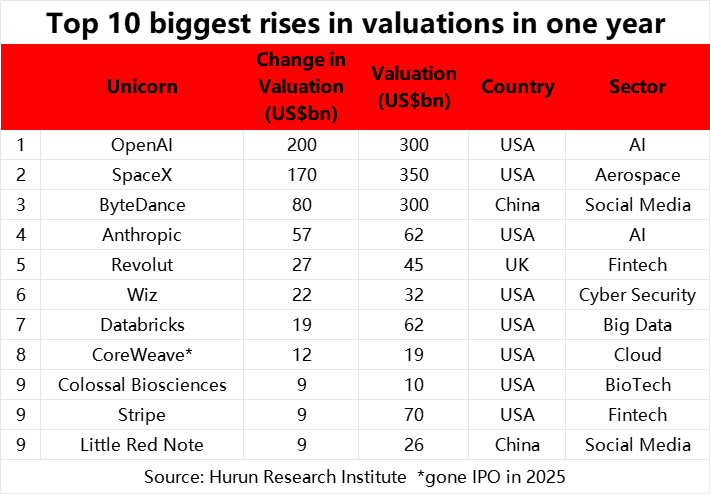
Top New Faces
Shenzhen-based smart car systems Yinwang and data server business xFusion were both spun-off from Huawei.
Better known for collaborative design, Figma has expanded into 3D printing applications, blending intuitive design tools with emerging digital manufacturing trends.
Infinite Reality offers immersive enterprise solutions, combining metaverse infrastructure and digital media to transform how businesses interact and collaborate.
A key player in China’s semiconductor sector, Unisoc designs mobile chipsets that power a wide range of smart devices, supporting the nation’s tech self-reliance push.
Perplexity AI delivers real-time, conversational search powered by AI, gaining popularity for its precise, source-linked answers and enterprise integrations.
One of Europe’s most promising AI firms, Mistral AI, develops open-weight large language models, positioning itself as a strategic alternative to US-based giants.
A spinout from Alphabet, SandboxAQ combines quantum computing with AI to address complex problems in cybersecurity, healthcare, and finance.
Formed from the merger of Honeywell Quantum Solutions and Cambridge Quantum, London-based Quantinuum is at the forefront of quantum computing applications and research.
Table 5: Top 10 New Faces
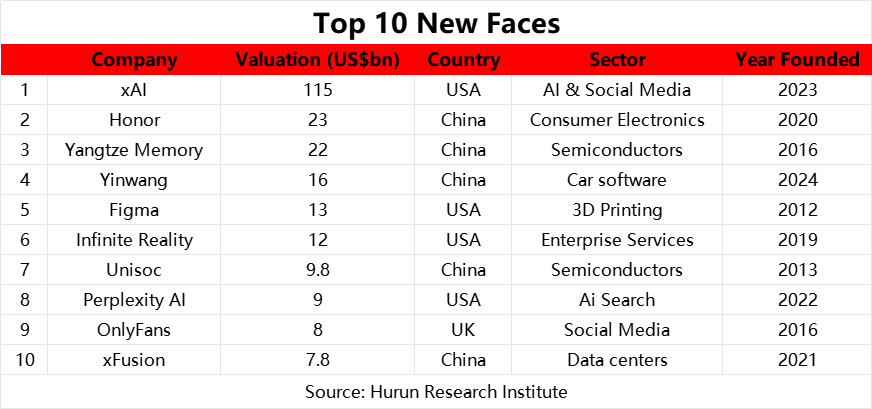
Unicorns gone IPO or acquired
64 unicorns from last year were ‘promoted’ out of the Global Unicorn Index, of which 34 went IPO and 30 were acquired.
China led the IPOs with 19 of the 34, followed by the US with 9 and India with 5. They went IPO mainly on the Hong Kong Stock Exchange with 12 companies, followed by NASDAQ with 8 and NSE & NYSC with 4 each.
The most successful IPO was New Jersey-based cloud data center provider Coreweave, which went IPO in Mar 2025, after the cut-off to the Hurun list, and today has a market cap of US$83bn. Others that did well include China-based ice cream cum bubble tea brand Mixue, with a market cap of US$27bn, and social media platform reddit with US$21bn.
Table 6: Top Unicorn IPOs of Last Year
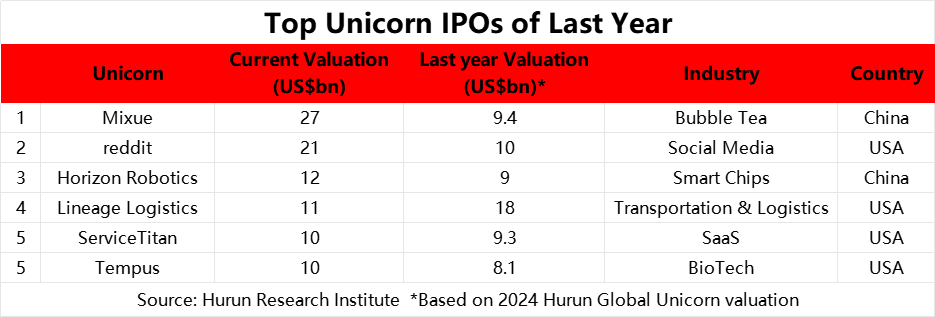
And, Who’s Down?
91 unicorns from last year saw their valuation drop, losing US$135bn. A further 52 unicorns from last year dropped out of the list completely, as their valuations fell below US$1bn. 19 of the drop-offs were from the USA, and11 from China.
FinTech, SaaS and E-commerce were the sectors most affected. New Energy also faced downward pressures, with 15 witnessing valuation drops, including China-based charging provider Svol, which was down US$2.4bn.
16 FinTech unicorns dropped in value, the most of any sector. London-based Rapyd led with a US$5.3bn drop in valuation, on the back of continued regulatory pressures. India-based OneCard and CRED were down US$2.8bn and US$2.5bn, respectively. Others down include Denmark-based Pleo and Israel-based Melio.
Several high-profile unicorns have faced steep valuation declines amid shifting market realities. Animoca Brands, once a poster child of the Web3 and NFT boom with a peak valuation of over US$20bn, reflecting the broader crypto downturn post-2022. JUUL Labs in the US has seen its value collapse from US$38bn, driven by mounting regulatory pressure and public health backlash against flavoured vapes. China’s Hozon Auto is affected by oversupply in the EV market and declining investor confidence in unprofitable auto-tech ventures.
Table 7: Top 10 unicorns with the biggest drops in valuations
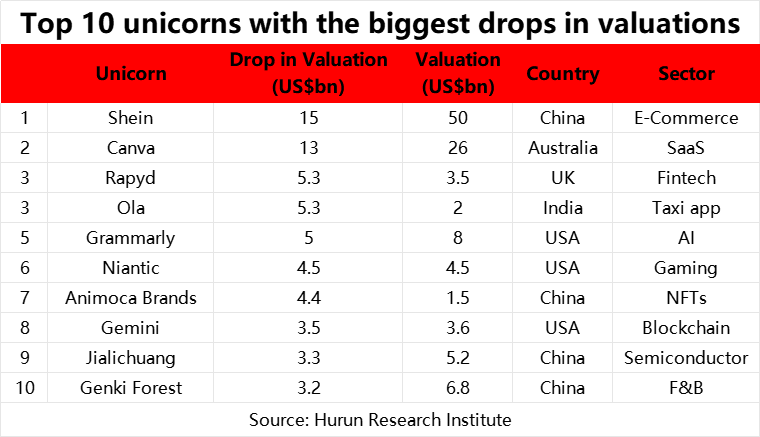
Table 8: Top 10 biggest dropouts in the last year
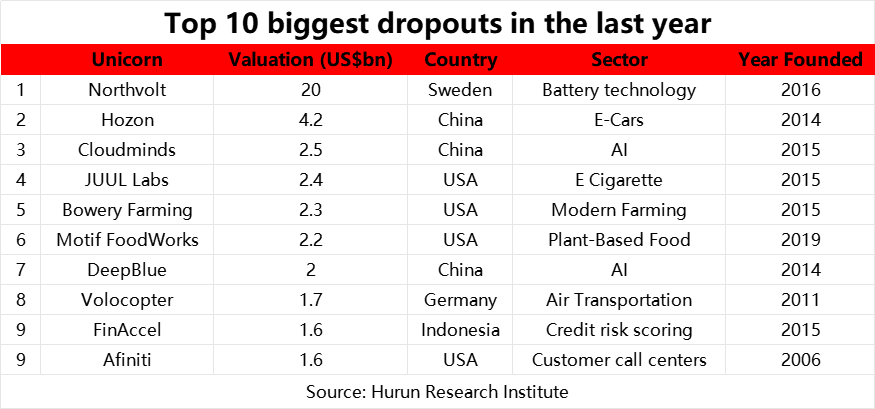
Which investors are the best at finding Unicorns?
Over 50% of the unicorns in the Global Unicorn Index 2025 are backed by just ten leading investors, underscoring their outsized influence on the global startup ecosystem. Tiger Global Management is the world’s most prolific unicorn investor with 191 investments, followed closely by SoftBank with 162.
Notably, Sequoia Capital has consolidated its position across regions, with a combined 129 unicorns through its various global arms. In terms of leadership, a handful of visionary individuals continue to drive this success: Scott Shleifer and Chase Coleman (Tiger Global), Masayoshi Son (SoftBank), and Douglas Leone (Sequoia) are among those credited with shaping the investment trajectories of some of the world’s most valuable startups.
For the full index of the Most Successful Unicorn Investors in the World 2025, see Appendix 2.
Table 9A: Most Successful Unicorn Investors Top 10
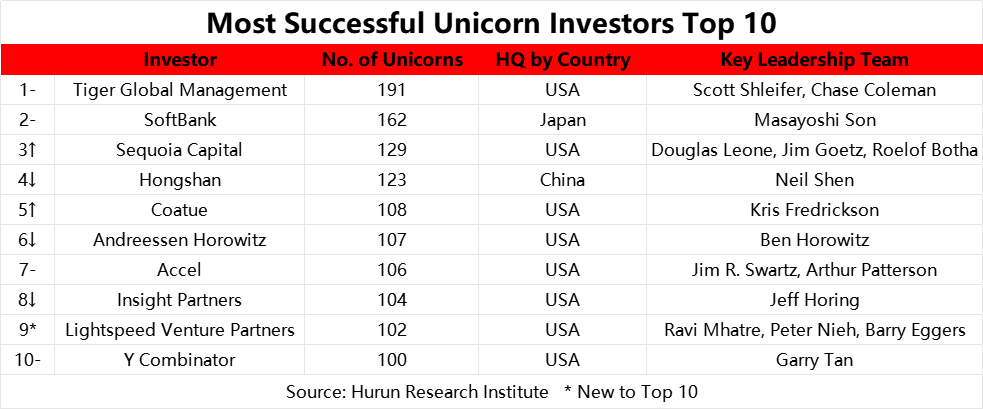
Table 9B: Most Successful Investors in China Unicorns – Top 30
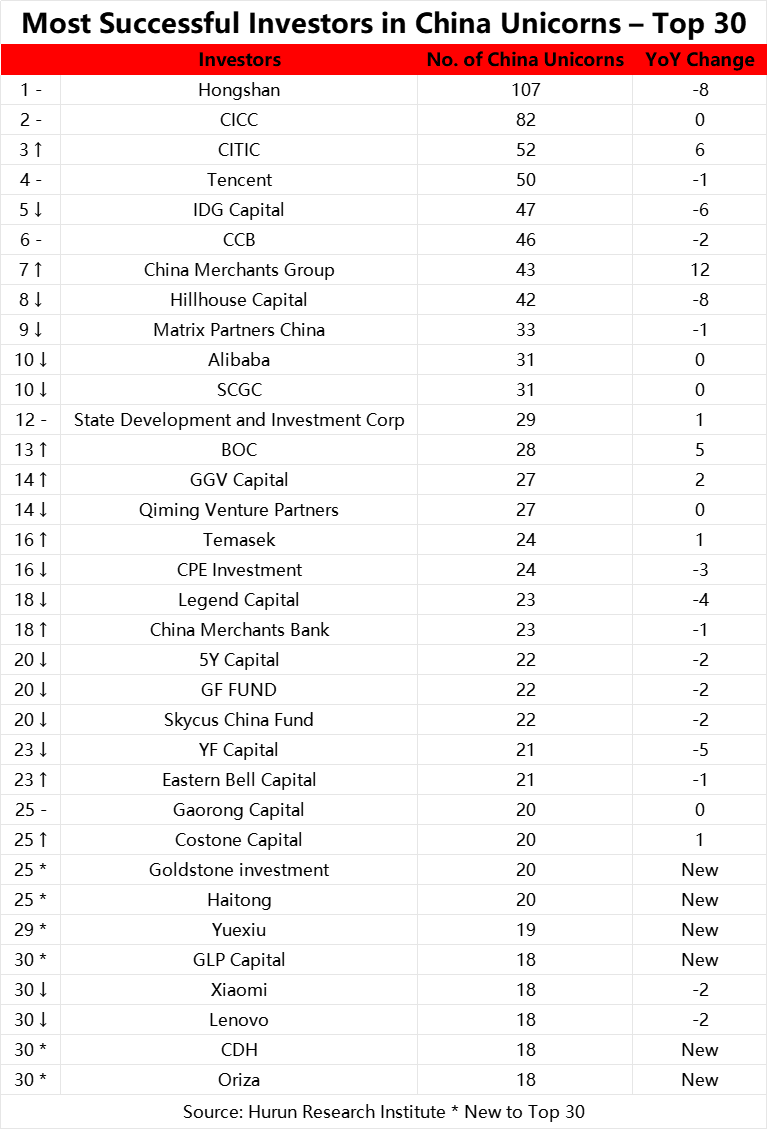
Youngest Unicorns
Over 55% of the unicorns in the Global Unicorn Index 2025 were founded in the last 10 years, contributing a combined valuation of US$2.8 trillion.
Remarkably, five companies founded in 2024 have already achieved unicorn status, reaching billion-dollar valuations in under a year. Of these, four are based in the USA and one in China, with China’s Yinwang standing out at a valuation of US$16bn. Four of the five belong to the broader AI theme, with Sequoia Capital backing three of these rapidly emerging unicorns.
Table 10: Youngest Unicorns
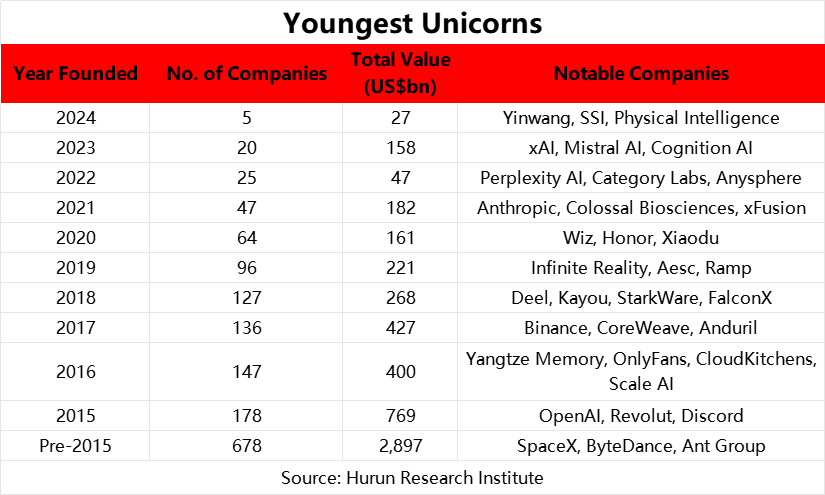
Serial Entrepreneurs
One of the most compelling revelations from this year’s Global Unicorn Index is the rise of serial entrepreneurs—visionary founders behind multiple billion-dollar ventures.
One person, Elon Musk, has founded 5 unicorns. 5 have founded three (Cheng Wei, Richard Liu Qiangdong, Robin Li Yanhong, Li Shufu and Zhang Lei) and 33 have founded 2.
Comparison between Cheetahs, Gazelles, Unicorns, and Global 500
Cheetahs are start-ups founded in the 2000s, not yet listed on a public exchange, and most likely to ‘go unicorn’ within five years. Gazelles are start-ups founded in the 2000s, not yet listed on a public exchange, and most likely to ‘go unicorn’ within three years. The Hurun Global 1000 is a list of the 1000 most valuable non-state-controlled businesses in the world.
The pipeline for the Hurun Global 1000 is the Global Unicorn Index, the pipeline for the Global Unicorn Index is the Hurun Global Gazelle Index, and the pipeline for the Hurun Global Gazelle Index is the Hurun Global Cheetah Index.
The US, China and India have a higher percentage of Cheetahs, Gazelles, and Unicorns, which over the next five years ought to translate into a higher percentage of Hurun Global 1000s. In the same way, Japan, Switzerland and Canada have a small percentage of start-ups, which suggests they will lose ground in the Hurun Global 1000.
By city, San Francisco, New York, Beijing, Shanghai, London, Shenzhen, and Bengaluru have more start-ups and ought to have more Hurun Global 1000s within five years. Tokyo and Paris have fewer startups, so are likely to see their percentage of the world’s most valuable companies go down. London seems to be stable.
By industry, Financial Services and Software & Services ought to grow into the Hurun Global 1000 companies.
Companies selling B2B and software & services are on the up.
Table 13A: By Country comparison for Cheetahs, Gazelles, Unicorns & the 500 Most Valuable Cos
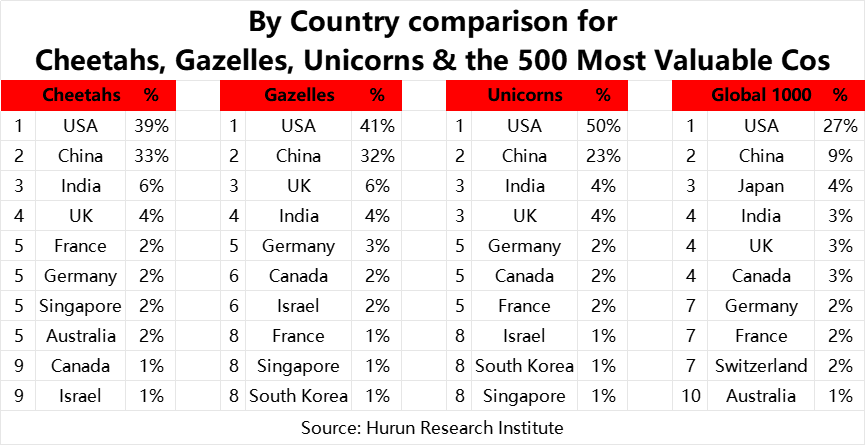
Table 13B: By Industry comparison for Cheetahs, Gazelles, Unicorns & the 500 Most Valuable Cos
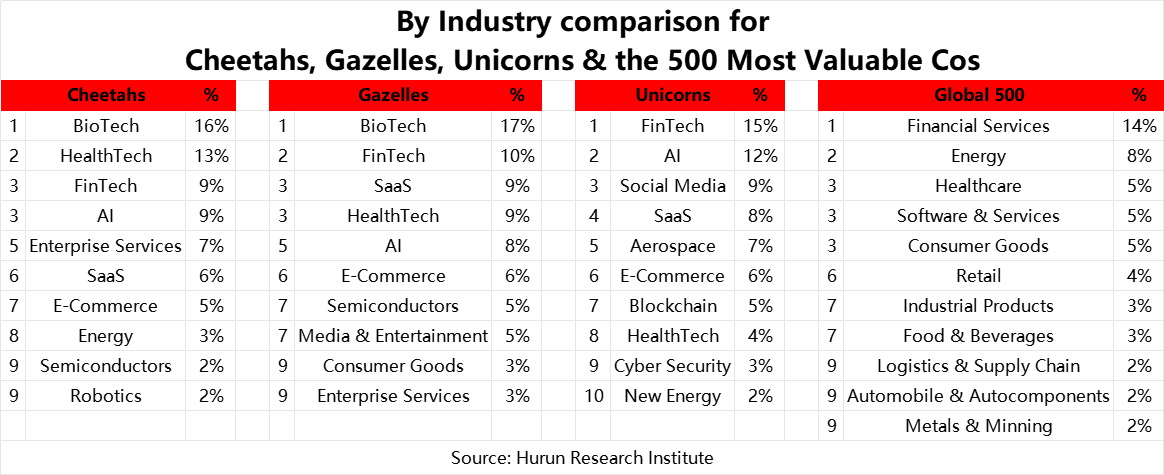
Table 13C: Comparison between Cheetahs, Gazelles, Unicorns & the 500 Most Valuable Cos

Key Statistics
Table 15A: Key Statistics for Global Unicorn Index

Table 15B: Key Statistics for USA

Table 15C: Key Statistics for China

Table 15D: Key Statistics for India

Table 15E: Key Statistics for the UK

Methodology
The Global Unicorn Index is compiled by the Hurun Research Institute and includes companies founded in the 2000s with a current valuation of US$1bn, not yet listed on a public exchange.
The cut-off for this year’s index was 1 January 2025, with significant valuation changes updated up to the date of release.
Many of the world’s top investment houses provided details of their portfolio, which the Hurun Research team cross-checked against specialized investment databases, industry experts, media sources, as well as unicorn co-founders.
Valuing unicorns can be tricky. The very nature of these super-fast-growing companies makes valuations hard to pin down, but to ensure consistency of the valuations, Hurun Research used the most recent valuation based on a sizeable round. Where it becomes harder is when a unicorn is underperforming or on its way down, since founders and investors are mostly loath to want to announce a down-round. In this case, Hurun Research used industry comparatives to ascertain a new lower valuation.
Startups like Hangzhou-based AI assistant DeepSeek and US-based Signal are not on the Hurun Unicorns Index because they have not commercialised their platforms.
Unicorns leave the Global Unicorn Index either by being ‘promoted’, ie, by listing on a public exchange (IPO) or being acquired, or by being ‘demoted’, when their value drops below US$1bn.
Hurun Research has been tracking unicorns since 2017.
Disclaimer. All the data collection and the research have been carried out by Hurun Research. This report is meant for information purposes only. Reasonable care and caution have been taken in preparing this report. The information contained in this report has been obtained from sources that are considered reliable. By accessing and/or using any part of the report, the user accepts this disclaimer and exclusion of liability, which operates to the benefit of Hurun. Hurun does not guarantee the accuracy, adequacy, or completeness of any information contained in the report, and neither shall it be responsible for any errors or omissions in or for the results obtained from the use of such information. No third party whose information is referenced in this report under the credit assumes any liability towards the user with respect to its information. Hurun shall not be liable for any decisions made by the user based on this report (including those of investment or divestiture), and the user takes full responsibility for their decisions made based on this report. Hurun shall not be liable to any user of this report (and expressly disclaim liability) for any loss, damage of any nature, including but not limited to direct, indirect, punitive, special, exemplary, consequential losses, loss of profit, lost business and economic loss regardless of the cause or form of action and regardless of whether or not any such loss could have been foreseen.
About Guangzhou
Guangzhou has five defining labels. First, it is designated as a Famous National Historical and Cultural City, with a history of 2,239 years. Second, it is home to around 19 million permanent residents, ranking fifth among Chinese cities, with a real-time service population exceeding 24 million. Third, it is ranked 8th among the top science cities in the Nature Index and among the top for the number of its unicorn companies globally. Fourth, it's an economic powerhouse with a GDP of RMB 3.1 trillion last year, which accounts for 2.3% of the national total and 22% of Guangdong Province's total, ranking 5th among China's 333 municipal administrative regions. Fifth, it is a National Forest City and a UN International Garden City, and has been named one of the world’s first "Lighthouse Cities".
These advantages in culture, market, innovation, industry, and environment have shaped Guangzhou's unique urban charm and competitive edge, making it a top destination for global businesses and talents to create new successes. Since last year, one out of every seven new foreign-invested enterprises in China has chosen to settle in Guangzhou. The city has led all pilot cities for business environment innovation in terms of the number and growth of newly registered market entities for 12 consecutive months. Currently, Guangzhou boasts over 50,000 foreign-invested enterprises and more than 2,000 projects from 362 Fortune Global 500 companies.
About Guangzhou Development District / Huangpu District
Located in the core area of the Pearl River Delta in Guangdong Province, Guangzhou Development District / Huangpu District is known as the "Pearl of the GBA", and is one of the first national economic and technological development districts. In 2024, it registered a regional GDP of more than RMB 430 billion and total industrial output of over RMB 820 billion, with multiple key economic indicators ranking top among the country's economic development districts, making it Guangzhou's hub of real economy, main engine of sci-tech innovation, and key platform for reform and opening-up.
Guangzhou Development District / Huangpu District is advancing the development of "Three Cities and One Island", namely, China-Singapore Guangzhou Knowledge City, Guangzhou Science City, Guangzhou Maritime Silk Road City, and Guangzhou International Bio Island. The District has established five trillion-level industrial clusters in sectors such as automotive manufacturing, new displays, green energy, new materials, and cosmetics & healthcare. In addition, it is home to three hundred-billion-level industrial clusters in biomedicine, high-end equipment, and integrated circuits. It is also making strides in emerging industries such as low-altitude aerospace, AI, and embodied intelligence robotics, accelerating the establishment of a "12136" modern industrial system.
Guangzhou Development District / Huangpu District is one of China's top regions for multinational company investments. The District is home to over 5,200 multinational companies, with more than 330 projects established by Fortune Global 500 companies. The District became the only Chinese winner of the UN Investment Promotion Award in 2019.
Guangzhou Development District / Huangpu District boasts impressive innovation capabilities. With the largest incubator cluster in South China, the District has ranked first among China's development zones in terms of sci-tech innovation capability for five consecutive years, as its R&D investment accounts for 6.8% of the district GDP, which is a world-leading level. As a technology-driven district, it has gathered more than 20,000 technology-based companies, over 3,000 national high-tech enterprises, and around 90 listed companies in recent years.
Guangzhou Development District / Huangpu District has a large talent pool, encompassing teams led by Nobel Prize Winners and professional teams led by academicians Zhong Nanshan, Wang Xiaodong, Shi Yigong, etc. Currently, the District has over 120 academician-led projects and more than 1,400 high-caliber talents, making it one of the most attractive talent hubs in China.
Guangzhou Development District / Huangpu District also offers a favorable business environment. It established the first Business Environment Reform Bureau among the cities of Beijing, Shanghai, Guangzhou, and Shenzhen. Nearly 100 reform and innovation practices have been replicated and promoted nationwide and across the province. The District has developed a service brand of "Two Improvements, Three Fulfillment, and Four Hearts," ensuring responsive services for businesses, creating a first-class business environment based on market principles, the rule of law, and international standards.
Guangzhou Development District / Huangpu District provides a wealth of supportive factors for businesses. It has rolled out value-added services addressing common business concerns related to funding, space, innovation, and supply-demand. Regarding space supply, the District promotes flexible land supply methods such as "joint land acquisition and building construction" for industry-linked enterprises, long-term leasing of industrial land, lease-before-transfer, and flexible-term land transfers. In terms of research resources, it encourages the sharing of R&D and pilot testing resources, opens applications and experimental environments to SMEs, and provides access to instruments, equipment, research personnel, technical support, and R&D cooperation. In the realm of financial empowerment, the District has created an investment and financing system that includes investment by state-owned enterprises, guidance from industrial funds, and the participation of social capital, and established a RMB 5 billion innovation fund.
About Hurun Inc.
Promoting Entrepreneurship Through Lists and Research
Oxford, Shanghai, Mumbai
Established in the United Kingdom in 1999, Hurun is a research and media group, promoting entrepreneurship through its lists and research. Widely regarded as an opinion-leader in the world of business, Hurun generated 8 billion views on the Hurun brand in 2023, mainly in China and India, and recently expanded to the UK, US, Canada, and Australia.
Best known for the Hurun Rich List series, telling the stories of the world’s successful entrepreneurs in China, India, and the world, Hurun’s other key series focus on young businesses and entrepreneurs, through the Hurun Unicorns Index, two Hurun Future Unicorns indices, the Hurun Uth series, and the Hurun Pioneers series.
Hurun has grown to become the world’s largest list compiler for start-ups, ranking over 3000 start-ups across the world through its annual Hurun Global Unicorns Index (startups with a valuation of US$1bn+), and two Hurun Future Unicorn Indexes: Gazelles, most likely to ‘go unicorn’ within three years, and Cheetahs, most likely to ‘go unicorn’ within five years.
The Hurun Pioneering Young Startups and Entrepreneurs series focuses on startups set up within the last ten years and founders aged 45 or under.
The Hurun Uth series includes the Under25s, Under30s, Under35s, and Under40s awards, representing the cream of each generation of young entrepreneurs who have founded businesses with a social impact and worth US$1m, US$10m, US$50m, and US$100m, respectively.
Other lists include the Hurun 500 series, ranking the most valuable companies in the world, China and India, the Hurun Global High Schools List, ranking the world’s best independent high schools, the Hurun Philanthropy List, ranking the biggest philanthropists and the Hurun Art List, ranking the world’s most successful artists alive today.
Hurun provides research reports co-branded with some of the world’s leading financial institutions and regional governments.
Hurun hosts high-profile events across China and India, as well as London, Paris, New York, LA, Toronto, Vancouver, Sydney, Luxembourg, Istanbul, Dubai, and Singapore.
For further information, see www.hurun.net.
For media inquiries, please contact:
Hurun Report
Porsha Pan
Mobile: +86-139 1838 7446
Email: porsha.pan@hurun.net
Grace Liu
Mobile: +86 136 7195 4611
Email: grace.liu@hurun.net
Global Unicorn Index 2025 TOP 100 s
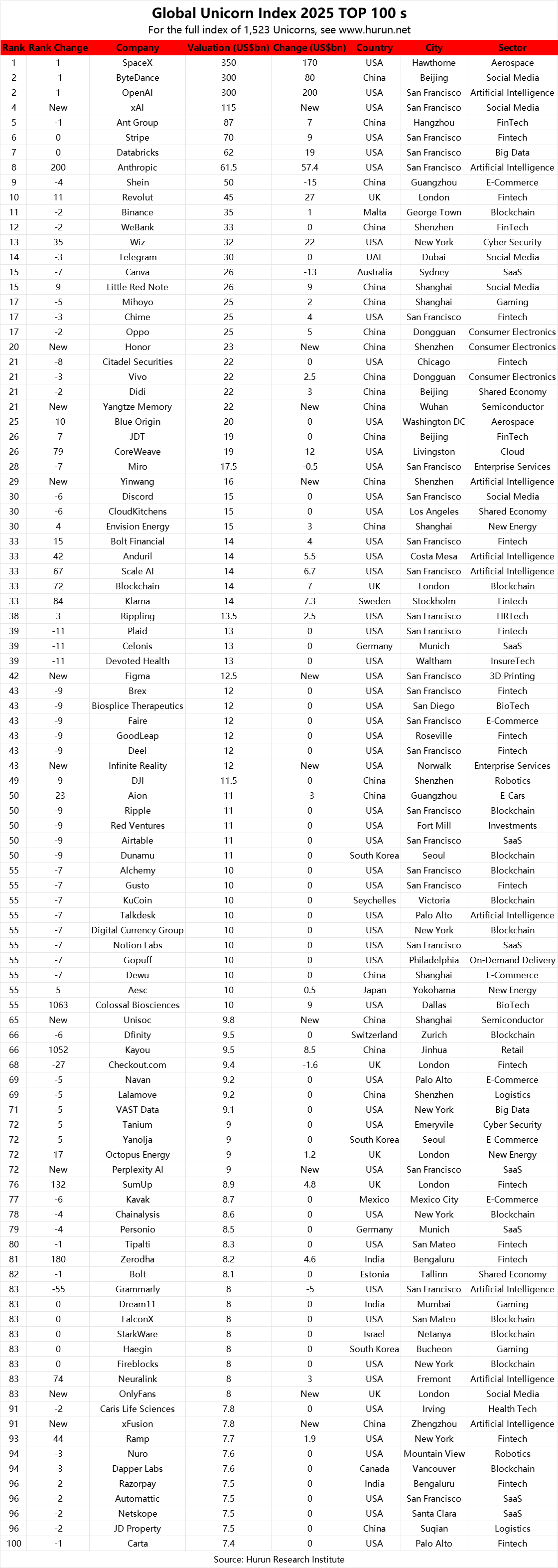
Appendix
Appendix 1: The Continent where the world’s unicorns are based
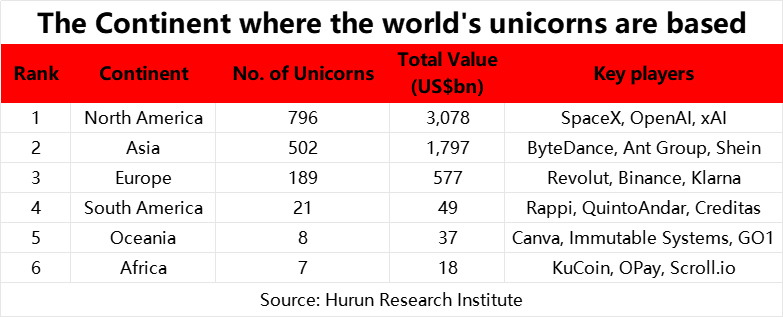
Appendix 2: Most Successful Unicorn Investors in the World 2025

Appendix 3: Unicorns founded by Indians outside of India
Table: Unicorns outside of India with an Indian co-founder

Appendix 4: Unicorns founded by Chinese outside of China
Table: Unicorns outside of China with a Chinese co-founder
